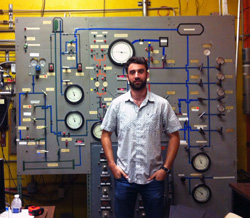Only Canadian student at Caltech event
Nick Sweet is the president of Space Concordia, a student-run astronautical engineering group.

Last year, Concordia alumnus and current Caltech PhD student Niccolo Cymbalist urged me to apply to a competition called the Caltech Space Challenge. When I heard it was a chance to plan a manned mission to one of Mars’ moons at the world’s highest-ranked university (according to the Times Higher Education 2012-13 world university rankings) under the guidance of NASA engineers, I knew I had to apply.
When I was accepted, I immediately felt excited, but I also related to the names of the two moons we would be considering: Phobos and Deimos (the Ancient Greek embodiments of fear and terror, respectively).
The 32 students were split into two teams to compete in the challenge. The majority of these students are currently working on impressive master’s and PhD projects, coming from top-notch institutions all over the world: Caltech, CERN, MIT, Stanford and Yale, to name a few. (A full list of participants and their schools can be found below.)
The striking aspect of this amalgamation of cerebral power is how down-to-earth each participant was; both teams formed strong bonds and meshed right away. On about the third day, I felt as if I’d known my team (Team Explorer!) for months, and I thought of Phobos and Deimos as moons to explore rather than their Greek symbols.
The students in the challenge were impressive, our advisors and jurors even more so: NASA systems engineers, Jet Propulsion Laboratory trajectory experts, SpaceX project managers, planetary scientists, and Lockheed Martin space exploration architects, among many other disciplines. I cannot explain the sheer magnitude of expertise that guided us without writing several books. So, suffice it to say, these were some of the top scientists, engineers and professors working in space exploration. Halfway through the week, we were given a huge surprise: a guest lecture by the second person ever to walk on the moon, Buzz Aldrin.

We had little time to appreciate the finer details of Caltech’s campus (including a koi pond nestled in a vibrant garden), as our schedule quickly became a gruelling 7 a.m.-to-midnight workfest. Designing a mission to a Martian moon is no small feat, but with a solid team, the right advice, and plenty of coffee, we knew we could do it.
As an undergraduate student with little background on the Martian system, I find it easy to take certain things for granted. For instance, if you wanted to send humans to a Martian moon, you’d expect that they could just climb out of the spacecraft and hop around on the surface, much like our special guest lecturer did on his moon mission.
There are major problems with this approach. For one, the space community still doesn’t know whether the dust that covers the moons is knee-deep or tens of metres deep. Skis might be more appropriate than boots.
Even more disconcerting, since Phobos and Deimos are so small (with surface areas comparable to urban Toronto and the Island of Montreal, respectively), their gravity is much weaker than the moon. Simply jumping could launch you into orbit around Phobos, and a well-thrown baseball would escape Phobos’ gravity entirely, flying freely into outer space.
The week-long Caltech Space Challenge culminated in a fantastic gala dinner, where, after some much-needed rest, we were able to mingle with a slew of space-industry dignitaries. The competition was incredibly close, but Team Voyager clinched victory for the second time in a row.
The Caltech Space Challenge will undoubtedly continue in the coming years, and I urge any Concordian interested in participating in this other-worldly experience to contact me so I can talk your ears off about it.
It’s a fitting coincidence that our mission plan to Phobos mirrored my own experience: travelling so far to learn so much, and returning to share that knowledge back home.
Space Concordia was recently profiled on Canal Savoir. Watch the video.
Related links:
• Space Concordia
• Concordia's Faculty of Engineering and Computer Science
• Times Higher Education 2012-13 university rankings
• Full list of participants and their schools
